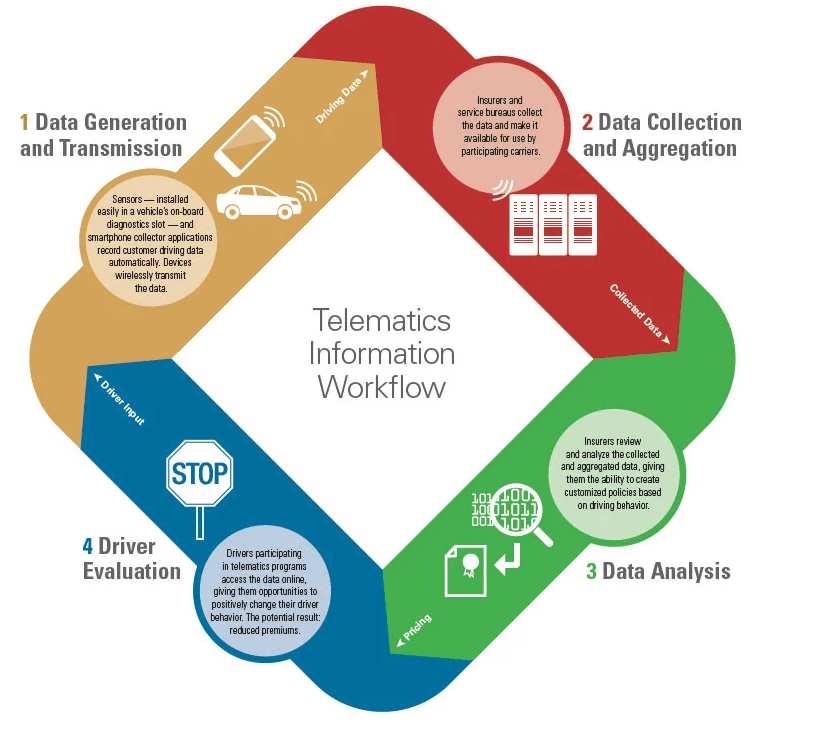Telematics is the combination of words, “telecommunications” & “informatics” . When this term is used in Insurance, it is called “Telematics Insurance”. Telematics in insurance works by fitting your car with a small device – commonly known as a ‘black box’. This records speed patterns and distance traveled as well as the type of roads you are using, and when.
Applications of Telematics:
Auto Insurance Telematics
Telematics are increasingly being used in auto insurance, with the introduction of Usage Based Insurance (UBI). The idea behind this is a pay-as-you-go system. For example, a driver who is rash and reckless will be charged for future premiums more than a responsible driver. It also eases in direct customer interaction and validation of claims in case of an accident.
Intelligent Vehicle Technologies
The evolution of telematics has led us to Intelligent Vehicle Technologies. IVT comprises of electronic, electromechanical as well as electromagnetic devices. These devices are used in conjunction with computer-controlled devices and radio receivers to aid in artificial intelligence. This helps car safety systems for making rides safer for the users.
Wireless Vehicle Safety Communications
This kind of telematics aid in car as well as road safety. Road hazards, location and speed of traffic are transmitted on short range radios. This keeps the drivers and home users updated about the most recent traffic conditions in your area, thereby greatly reducing the chance of accidents and traffic congestions.
Tracking of Shipments
Telematics is also used to track freight containers using Global Positioning Satellites (GPS) for increased security and safety. This feature is becoming increasingly important as more shipping companies are modernizing their business infrastructure.
Similarly, tracking the movement and position of trailers can also be carried using a mobile network or geo-satellite communication. This software directly updates the tracking details through a PC or web-based software.
Driverless Cars
Google was the first to present us with a working prototype of self-driving cars. Since then, there have been numerous driving tests that have been deployed. The future of this technology looks promising.
However, there are few kinks that need to be adjusted. Companies garnered a lot of heat in the news due to minor accidents caused by driverless cars. Regardless of these trivial issues, we are looking towards a bright and innovative future.
Family and Friends Tracking
Telematics can also help you easily locate your friends and family. With the Internet of Things (IoT) on the rise, we can expect fine-grained control of the tracking features. This in turn will help provide assistance in case of emergencies as it has been observed that if help is given on time, it can greatly impact the survival rate of the victim.
Black-Box Device
The” Black Box” tracking device will help to locate the stolen cars, locate vehicles during emergencies. GPS system installed in the device will help locate the vehicle on real time basis further providing security to the vehicle & the travelers like family members of the Vehicle owners. The huge data generated would eventually help the analyzers warn the users about areas of thefts & accident-prone zones reducing the fatal accident rates.
Thus, Telematics will help to make Vehicle drivers more aware of safe driving techniques, ultimately contributing to society by providing disciplined drivers, further providing safer roads for all citizens of the nation. Last but not least, telematics will help reduce traffic congestion & pollution.
Challenges with Telematics Insurance:
Problems in India
Telematics in India is unlikely to have a major impact on pricing, because of one simple reason: third-party premiums are already fixed by the regulator. Own-damage premiums are going down because of no-claim bonus or as cars get older and their value goes down, the third-party premium are standard.
High-end cars in India are driven by drivers. Also, we have a culture that a car is driven by more than one person. So, it will be difficult for telematics system to recognize any one driving behavior. Also, in telematics where you drive is more important than how you drive.
Problems in the World
Typically, telematics is making an impact in other countries essentially in third-party. Telematics in India, you might have a car and say that I will drive the car only on my birthday. You still need third-party insurance, and no amount of telematics can bring it down.
I do not know of any country in the world where more than 5% of the cars have telematics. Telematics has been around for more than 10 years now. If you ask any insurance company that offers telematics, they will be reluctant to tell you how many cars have that system, because the number will be very low.
Problems with costing:
Typically, a telematics device is priced between Rs. 2,500 and Rs. 3,000. Who will fund this device? If insurance companies give it themselves and also give a discount in future, how will they fund it? And why would a customer buy a it for Rs.3,000 for a possible reduction of premium of Rs3,000 over 3 years? This is again one of the things that people are talking about.
Conclusion
Huge volume of data will be used by Insurance Companies, but the fact remains that with such a high volume of data being captured there will be data errors. To head off data anomalies, many of the data governance principles must be implemented to ensure data integrity.
To test your knowledge on Telematics, give this short quiz: https://theactuarialclub.com/quiz/telematics/.
For more such articles visit The Actuarial Club.
This article was edited by Kautilya Sharma.

